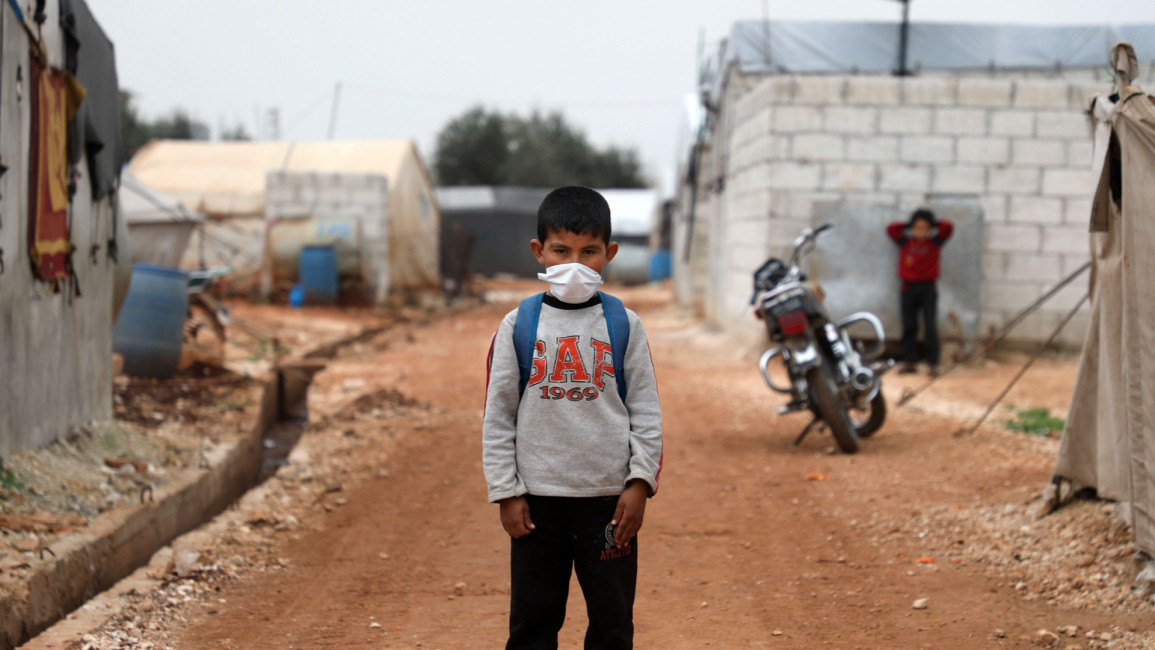Syria fighting could spark coronavirus outbreak in Idlib, NGO warns
Syria fighting could spark coronavirus outbreak in Idlib, NGO warns
There are fears of an escalation in fighting in Idlib province, potentially leading to a new humanitarian crisis.
4 min read
Idlib province has some of the worst conditions in the world [Getty]
Fresh fighting in Idlib province threatens a new humanitarian crisis in northwest Syria, where the threat of Covid-19 still looms large and thousands of families live in cramped and basic shelters without adequate food, water or cleaning products.
Syrian regime forces fought with extremist groups in southern Idlib province last week and periodic clashes continuing.
Russia launched its first airstrikes since March last week, killing two civilians, while further shelling and bombing has forced thousands to fleeing northwards to densely populated areas.
The fighting could potentially shatter a ceasefire brokered by Russia and Turkey in March, which ended a regime offensive in southern Idlib and western Aleppo after a million people were displaced from their homes.
"Although the ceasefire had meant there had been no airstrikes since March, fighting continued intermittently on the ground and our understanding is that the recent airstrikes were carried out in retaliation against an attack on government of Syria positions on 8 July," Misty Buswell, MENA Policy and Advocacy Director for the International Rescue Committee (IRC), told The New Arab.
"Whatever the causes of this escalation, parties to the conflict need to immediately de-escalate and adhere to the ceasefire, and ensure that civilians are protected, in line with their obligations under international humanitarian law."
|
|
There are fears that the clashes could escalate into a full-scale battle with Hurras Al-Din and other Al-Qaeda affiliated groups involved forming an operations room on Monday, a sign that the fighting could continue.
Hayat Tahrir Al-Sham, which controls much of Idlib province, and Turkish-allied rebel groups were reportedly not involved last week's fighting and have largely respected the ceasefire.
Continued fighting and more intense air strikes could drag more parties into the conflict, leading to a dangerous situation for already vulnerable civilians in Idlib.
"With the airstrikes that breached the ceasefire at the start of last week, numbers are still being verified but some reports suggest that 5,000 people fled their homes," Buswell added.
"There were two further airstrikes over the weekend, and it can't be stressed enough that if the fighting escalates, we will see more people follow in their footsteps. Additionally, the gains that have been made to prevent Covid-19 in the northwest will quickly be erased and reversed."
Although Idlib province has no recorded cases of the coronavirus, NGOs have voiced fears that an outbreak might occur at any time due to the low level of testing in the region.
Immune systems of Syrians living in Idlib are also likely weak due to months and years of hardships and poor health.
The disease threatens to do immense damage to communities living in packed camps and makeshift shelters, where up to 15 people share one tent.
People of all ages could be vulnerable to the disease given that the plunging Syrian lira has seen food, water, and cleaning products become even more unaffordable in Idlib, Buswell said.
"Not only are we seeing malnutrition among children, but it is increasing among pregnant and breastfeeding women as well, which is a clear indication of how bad the conditions are," the IRC policy and advocacy director added.
The province's homes and camps were already at full capacity and resources stretched before the last offensive began, after displacements caused by previous regime assaults and agreements resulting in thousands of rebel fighters and families forced to leave opposition areas for Idlib.
The displacement of more than 1 million people during the regime's offensive between December and March overwhelmed NGO and aid agencies, with multiple families sharing spaces in mosques, schools, disused buildings, and tents.
"In these locations, on top of overcrowding being a major concern, there is also a lack of water and sanitation meaning not only that the ability to practice social distancing is limited, but that the ability to carry out extra hand washing is limited as well," Buswell added.
"This means the disease will spread fast when it reaches these communities. To add to this, the health system in Idlib is in no fit state to cope with a pandemic."
Last week, SAMS opened Idlib's first hospital for treating and isolating coronvirus patients, but there will be huge challenges for overwhelmed and under-equipped medical workers in the event of a Covid-19 outbreak.
"Hospitals are already struggling to cope with existing needs, ventilators and ICU beds are limited, and health teams are over-stretched and over-worked," said Buswell.
"If Covid-19 starts to spread, a health system already on the brink of collapse will be pushed even further towards the edge."
Paul McLoughlin is a news editor at The New Arab.
Follow him on Twitter: @PaullMcLoughlin



